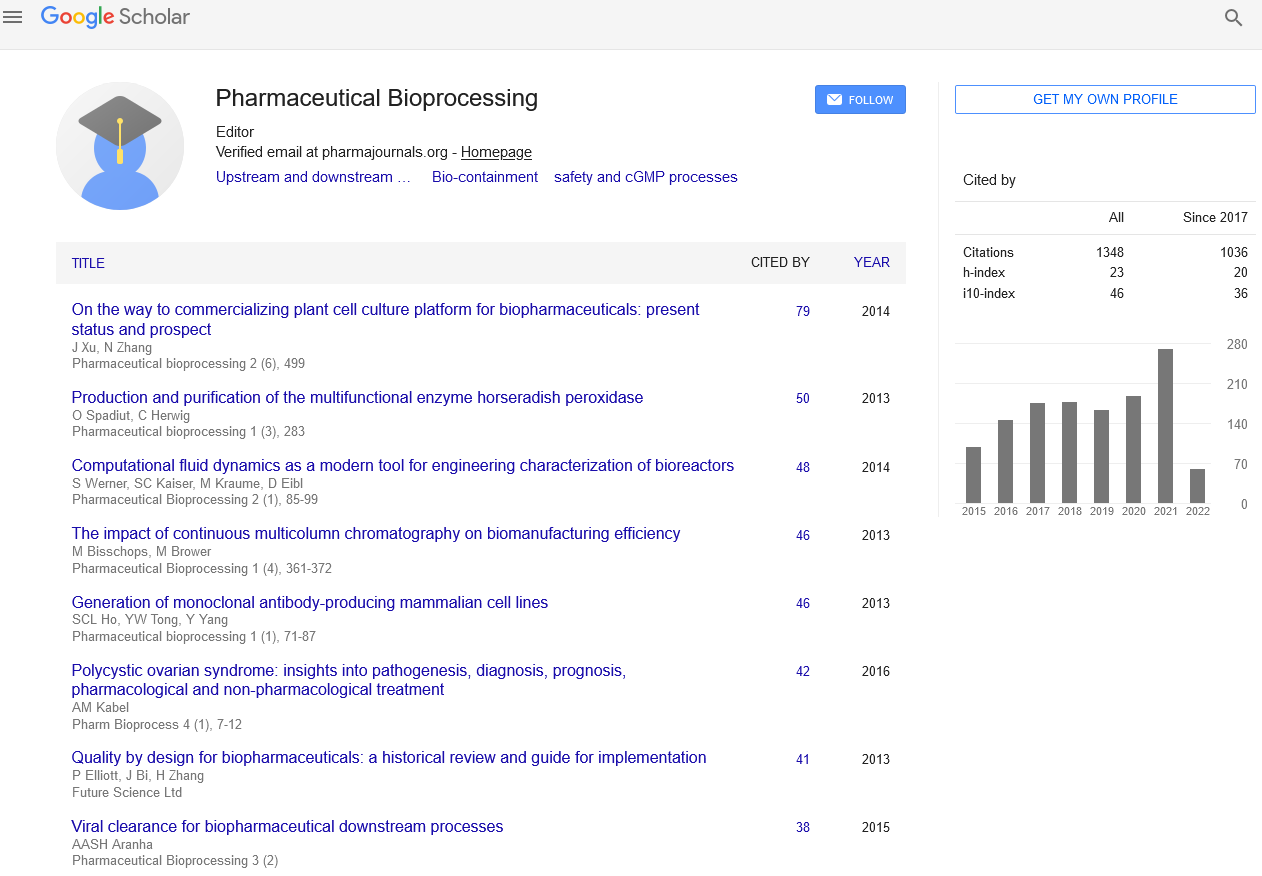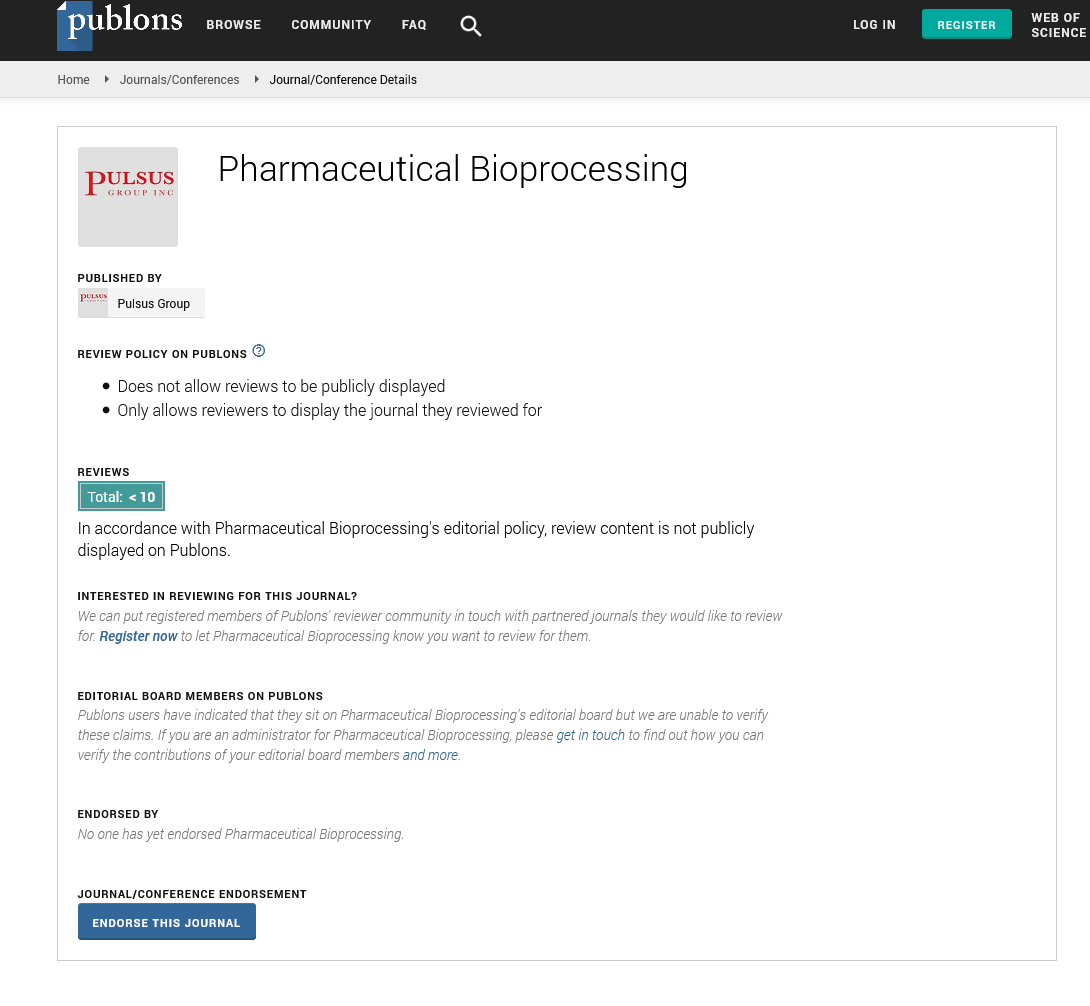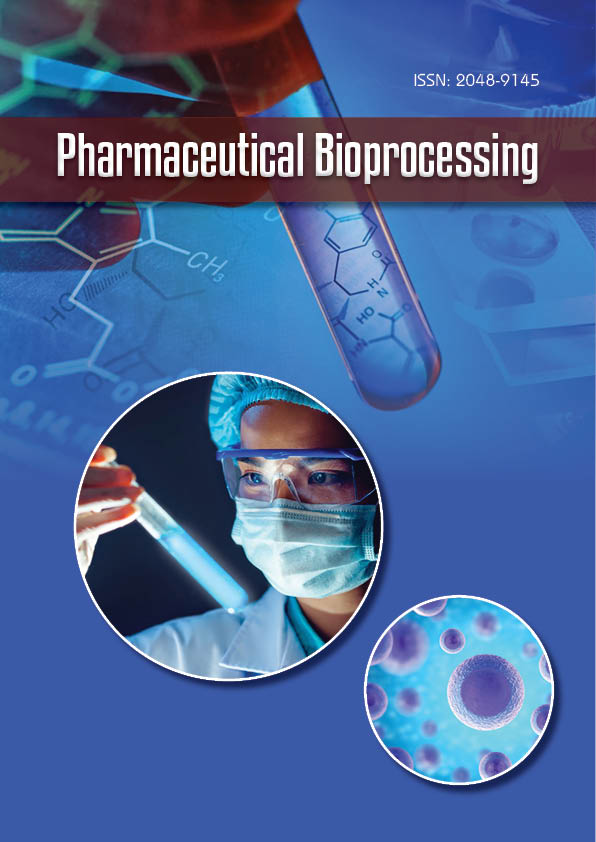Editorial - Pharmaceutical Bioprocessing (2017) Volume 5, Issue 2
Targeted cancer therapy
- *Corresponding Author:
- Xiaoguang Liu
Department of Biomedical Engineering
University of Alabama at Birmingham
1670 University Blvd., Birmingham, AL 35233, USA
E-mail: mliu@uab.edu
Abstract
Keywords
targeted cancer therapy, monoclonal antibody, antibody-drug conjugate, cellular immunotherapy
Cancer is one leading cause of mortality that is associated with genetic background or environmental toxin [1]. Multiple anti-cancer therapies have been developed and applied clinically such as surgery, chemotherapy, radiotherapy, therapeutic antibody, small molecule, Antibody-Drug Conjugate (ADC), cellular immunotherapy, chemoimmunotherapy, and radioimmunotherapy. In this article, we will discuss three types of effective targeted cancer therapies: 1) Therapeutic antibody, 2) Antibody-drug conjugate, and 3) Cell-based immunotherapy.
Therapeutic antibody
Monoclonal antibody (mAb) is the most successful protein-based therapy for cancer treatment. During the process of carcinogenesis, the undesired mutation activates the proto-oncogenes or inactivates tumor suppressor genes. Thus some surface displayed molecules involved in oncogenic pathways or cell growth factors regulating cell proliferation process are overexpressed [2,3] and the immune checkpoints are blocked to counteract the anticancer immune response [4]. The therapeutic antibodies specifically target the cell surface receptors, and kill cancer cells via the mechanisms of antagonism, signalling, Complement Dependent Cytotoxicity (CDC) and Antibody- Dependent Cell-mediated Cytotoxicity (ADCC) [5]. Since the first-generation murine antibody is developed, the development of new-generation chimeric and humanized antibodies significantly extend the half-life and reduce the immunogenic response of injected therapeutic mAb.
Various monoclonal antibodies have been developed to treat different cancers. For example, the anti-breast cancer antibodies, Trastuzumab/Herceptin® and Pertuzumab/ Perjeta®, can block HER2 signaling protein kinase and phosphoinositide 3-kinase and inducing ADCC [6,7]. The anti-colorectal cancer antibodies, Bevacizumab/Avastin®, Cetuximab/Erbitux® and Panitumumab/ Vectibix®, inhibit Vascular Endothelial Growth Factor (VEGF) and therefore block new blood vessel formation and cell proliferation. Three antibodies targeting the B-cell surface antigen CD20, Rituzumab (Rituxan®), Ofatumumab (Arzerra®) and Obinutuzumab (Gazyva®), treat Non-hodgkin’s Lymphoma (NHL), Chronic Lymphocytic Leukemia (CLL), lymphomas and hairy cell leukemia via mediating B-cell lysis through ADCC, CDC and apoptosis.
The clinical application of targeted anticancer antibodies has greatly extended the lives of cancer patients. In addition to these US FDA approved mAbs, there are thousands of therapeutic antibody pipelines in different stages of clinical trials. The monoclonal antibodies still remain the fastest growing segment in the anti-cancer biopharmaceutical market [2].
Antibody-Drug Conjugate (ADC)
Antibody-Drug Conjugate (ADC) integrates the advantages of monoclonal antibody which can specifically target cancer associated surface antigen and the chemotherapeutic small molecule with highly potent cytotoxic. The ADC circulates in bloodstream until its mAb binds to the specific surface antigen of tumors. After binding, the receptor-mediated endocytosis enables the internalization of ADC, followed by lysosomal degradation, cleavage and release of the cytotoxic free drug into the cytoplasm, and apoptosis of cancer cells.
The first ADC, gemtuzumab ozogamicin (withdrawn in 2010), was approved by the FDA in 2000. Two FDA approved ADCs, Brentuximab vedotin/Adcetris® and Ado-trastuzumab Emtansine/Kadcyla®, are applied to treat the CD30-positive relapsed Hodgkin lymphoma and systemic anaplastic large cell lymphoma, and the HER2-positive relapsed or chemotherapy refractory breast cancer, respectively [8,9]. The drugs monomethyl auristatin E (MMAE) and maytansinoids (DM1) used in these two ADCs show high potent by targeting tubulin.
To improve the clinical efficiency of ADCs, it is important to improve the specific targeting of receptor on cancer cells, increase the cytotoxic potency of small molecules, and develop or choose innovative linkers [10]. The application of full-length mAb that specially targets the cancer cell surface receptor extends the half-life of ADC, enables cancer cells sustainably exposed to ADC, and reduces the toxicity to normal cells. As compared to the whole antibody, the antibody fragment improves the penetration of ADC in solid tumors [11]. The tumor specific cleavable linker can improve the stability of ADC in bloodstream and reduce the toxicity to normal cells [12]. Since drug is released within the cancer cells, the highly potent cytotoxic compounds, such tubulin-targeting and DNA-damaging agents, can be used in ADC.
Immunotherapy
The cellular immunotherapy has been developed to treat cancer via: 1) Infusing a new immune system such as hematopoietic stem cells that can be isolated from the bone marrow, adipose tissue, umbilical cord, fetal liver, muscle and lung [13], 2) Activating the resident immune dendritic cells (DCs) by antigen or vaccine to generate circulating CD4+ and CD8+ T cells that specifically target tumour [14], or 3) Infusing the engineered immune cells such as T cells and NK cells [15].
Recent years have seen exciting breakthroughs in immunotherapy development by genetically engineering chimeric antigen receptor (CAR)-T cells to treat B cell leukemia, various solid cancers, or other diseases [16-18]. The CAR-T cells contain the cancer-targeting domain derived from the single chain variable fragment (scFv) of monoclonal antibody, signaling domain (CD3 zeta), co-stimulatory molecules (CD27, CD28, OX40 or 4-1BB), and other elements [19,20]. CAR-T cells specifically target the surface receptors (proteins, glycoproteins or glycolipids) of cancer cells via scFv; stimulate the CD3 zeta via conformational change and transmit signals of proliferation, differentiation and persistence to T cells facilitated by co-stimulatory molecules; and activate the intracellular machinery of T cells to generate the antitumor cytotoxic T lymphocytes from the differentiation of CD8+ T cells facilitated with the cytokines secreted from CD4+ T cells. It has been demonstrated that CAR-T is a more effective modality against terminal cancers than mAbs, antibody-drug conjugates, and T cell receptor-engineered T cells [21,22].
The FDA panel recommended approval of using CAR-T cellular therapy to treat leukemia on July 12, 2017, which means that this kind of anti-cancer immunotherapy could be approved by end of September, 2017. Besides the intensive effort to develop CAR-T for leukemia and lymphoma treatment, advanced cell engineering technologies have been performed to construct novel CAR-T to improve the migration, proliferation and survival, and resistance to tumour-derived immunosuppressive factors for solid tumors treatment [23]. The high quality of CAR-T cells are very important for treat cancer, which can be achieved by developing and engineering effective cellular biomanufactuing process.
In addition to T cells, the natural killer (NK) and natural killer T (NKT) cells that can detect cellular metabolism changes and gene expression changes are also good candidates engineer and develop a novel promising anti-cancer immunotherapy [24].
Targeted cancer therapies have the capabilities to specifically target cancer cells by antibody, antibody-drug conjugate, engineered immune cells and other therapeutics while minimizing the side effects on normal cells. Despite the high efficiency of these targeted therapies, the tumor heterogeneity with respect to molecular targets leads to the high need to develop personalized medicine [25]. The multi-Omics technologies can be used to identify the patient specific targets through investigating the whole cell profiling of genes, proteins and metabolites for the development of specific personalized anti-cancer medicines.
References
- Katoh M. Therapeutics targeting angiogenesis: genetics and epigenetics, extracellular miRNAs and signaling networks. Int. J. Mol. Med. 32(4), 763–767 (2013).
- Kuroki M, Shirasu N. Novel treatment strategies for cancer and their tumor targeting approaches using antibodies against tumor–associated antigens. Anticancer. Res. 34(8), 4481–4488 (2014).
- Carmeliet P, Jain RK. Molecular mechanisms and clinical applications of angiogenesis. Nature. 473(7347), 298–307 (2011).
- Schreiber RD, Old LJ, Smyth MJ. Cancer immunoediting: integrating immunity’s roles in cancer suppression and promotion. Science. 331(6024), 1565–1570 (2011).
- Khurshid H, Sinclair N. Use of monoclonal antibodies in oncology. Med. Health. Rhode. Island. 94(11), 325–328 (2011).
- Baselga J, Swain SM. CLEOPATRA: a phase III evaluation of pertuzumab and trastuzumab for HER2–positive metastatic breast cancer. Clin. Breast. Canc. 10(6), 489–491 (2010).
- Zhou L, Xu N, Sun Y et al. Targeted biopharmaceuticals for cancer treatment. Canc. Lett. 352(2), 145–151 (2014).
- Pereira DS, Guevara CI, Jin L et al. AGS67E, an Anti–CD37 Monomethyl Auristatin E Antibody–Drug Conjugate as a Potential Therapeutic for B/T–Cell Malignancies and AML: A New Role for CD37 in AML. Mol. Canc. Ther. 14(7), 1650–1660 (2015).
- Polakis P. Antibody–drug conjugates for cancer therapy. Pharmacol. Rev. 68(1), 3–19 (2016).
- Ducry L, Stump B. Antibody–drug conjugates: linking cytotoxic payloads to monoclonal antibodies. Bioconjugate. Chem. 21(1), 5–13 (2009).
- Lyon RP, Bovee TD, Doronina SO et al. Reducing hydrophobicity of homogeneous antibody–drug conjugate improves pharmacokinetics and therapeutic index. Nat. Biotech. 33(7), 733–735 (2015).
- Weis SM, Cheresh DA. Tumor angiogenesis: molecular pathways and therapeutic targets. Nat. Med. 17(11), 1359–1370 (2011).
- Wei X, Yang X, Han ZP et al. Mesenchymal stem cells: a new trend for cell therapy. Acta. Pharmacol. Sinica. 34 (6), 747–754 (2013).
- Palucka K, Banchereau J. Cancer immunotherapy via dendritic cells. Nat. Rev. Canc. 12(4), 265–277 (2012).
- http://www.asgct.org/general–public/educational–resources/gene–therapy–and–cell–therapy–for–diseases/cancer–gene–and–cell–therapy
- Kershaw MH, Westwood JA, Darcy PK. Gene–engineered T cells for cancer therapy. Nat. Rev. Canc. 13(8), 525–541 (2013).
- Tao ZF, Wang M, Wang J. Advances in immunotherapy of acute myeloid leukemia by using chimeric antigen receptor modified T cells. Zhonghua. Xue. Ye. Xue. Za. Zhi. 37(2), 160–163 (2016).
- Feng K, Guo Y, Dai H et al. Chimeric antigen receptor–modified T cells for the immunotherapy of patients with EGFR–expressing advanced relapsed/refractory non–small cell lung cancer. Sci. China. Life. Sci. 59 (5), 468–479 (2016).
- Sharpe M, Mount N. Genetically modified T cells in cancer therapy: opportunities and challenges. Dis. Model. Mech. 8 (4), 337–350 (2015).
- Dai H, Wang Y, Lu X et al. Chimeric Antigen Receptors Modified T–Cells for Cancer Therapy. J. Nat. Canc. Inst. 108(7), djv439 (2016).
- Rapoport AP, Stadtmauer EA, Binder–Scholl et al. NY–ESO–1–specific TCR–engineered T cells mediate sustained antigen–specific antitumor effects in myeloma. Nat. Med. 21 (8), 914–921 (2015).
- Maus MV, Levine BL. Chimeric Antigen Receptor T–Cell Therapy for the Community Oncologist. Oncologist. 21(5), 608–617 (2016).
- Srivastava S, Riddell SR. Engineering CAR–T cells: Design concepts. Trends. Immunol. 36(8), 494–502 (2015).
- Vivier E, Ugolini S, Blaise D et al. Targeting natural killer cells and natural killer T cells in cancer. Nat. Rev. Immunol. 12(4), 239–252 (2012).
- Padma VV. An overview of targeted cancer therapy. Biomedicine. 5(4), 1–6 (2015).


